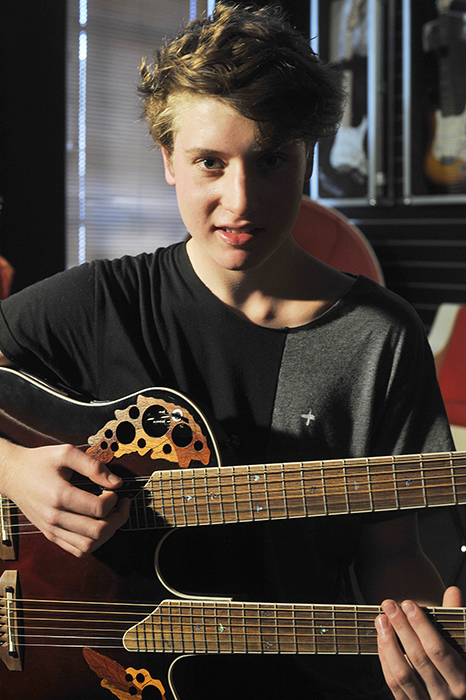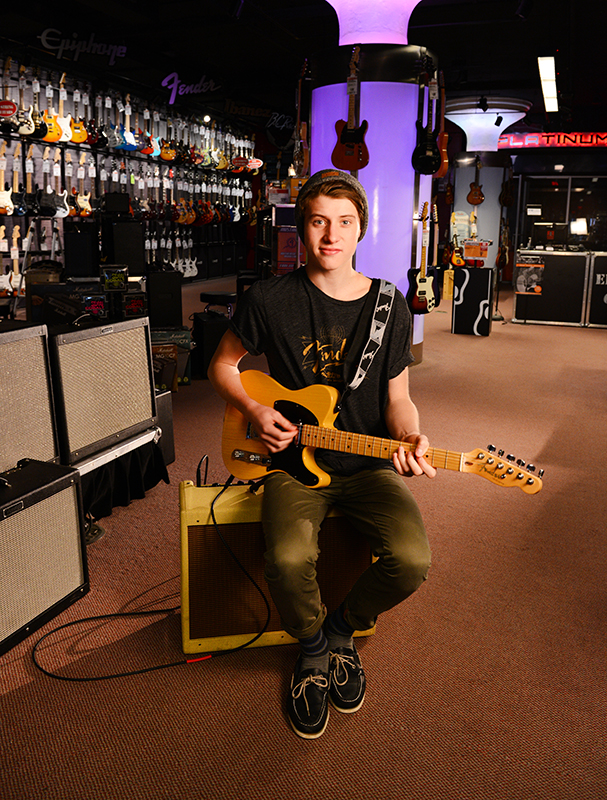By: Robert M. Knight and Rick Landers

Jacob Morris – photo credit: Robert M. Knight
Jacob Morris is a young Christchurch, New Zealand, based songwriter, singer and self-taught guitarist whose music is a mixture of blues, roots, folk, pop and rock.
Jacob plays a range of music styles, including one man band looping, using a variety of 6-string, 12 -string, hybrid and double-neck acoustic guitars.
In 2013 he picked up Best Original Song and Musicianship Award at the regional finals of Smokefree Rockquest 2013. He then went on to take the 2013 Rockquest National Musicianship Award – being one of the youngest winners in the 25 year history of Rockquest.
Jacob was also selected to audition for New Zealand’s Got Talent show. He served as the guitarist in the Christchurch Boys High School jazz band, a group that picked up a silver medal at the South Island Secondary School jazz competition in Blenheim.
Jacob’s main focus is songwriting and he writes with a combination of genres to appeal to a broad spectrum of audiences.
Most of Jacobs songs are originals featuring vocal melodies, catchy hooks and complex guitar solos. He also covers a collection of songs by artists, such as Stevie Ray Vaughan, Matt Corby, Bastille, John Butler and Jimi Hendrix.
This year, Jacob is expanding his knowledge of songwriting, while he writes new material and develops as a guitarist, singer and all around performer.
As a guitarist who’s joined The Brotherhood of the Guitar, he finds himself supported by music industry giants, Fender, Ernie Ball Strings and Guitar Center, as well as artists such as Orianthi, Steve Vai and Joe Bonamassa.
******
Rick Landers: How fast has your music career been moving since you began to work with Robert M. Knight and his The Brotherhood of the Guitar?
Jacob Morris: Meeting Robert and being inducted into the Brotherhood has been an invaluable experience and has really helped me get noticed.
Being from the most remote part of the planet, Robert has connected me with some of the best guitarists in the world, for which I will always be grateful. He is a great mentor, he knows what you need to do to be successful and he is very well connected – so now I know it is up to me to do the hard yards.
Rick: When you began to learn the guitar, what music were you listening to and was it the same as what you enjoyed playing?
Jacob Morris: My first guitar was a quarter size, nylon string, Ashton guitar that I used for classical guitar lessons for a couple of months without interest.
I learnt a couple of tunes, but never felt motivated to practice. I discovered the likes of Led Zeppelin, Pink Floyd and Guns N’ Roses when I was 11 or 12 and began trying to figure out the “Time” and “Sweet Child O’Mine” solos on the non-cutaway nylon guitar. I learnt to use my ear for teaching and quit lessons and spent all my time trying to play lead guitar like my heroes.
I soon discovered Eric Johnson, my all time favorite guitarist, and found a copy of his Hot Licks DVD, which I have to thank for technique and tone. A year or so later got my first electric guitar, a Les Paul copy. I eventually transitioned back to acoustic guitars, as I found I could be more innovative on an acoustic guitar. I found it hard to find my own sound on an electric guitar.
CHECK OUT THE BROTHERHOOD OF THE GUITAR STRATOCASTER CONTEST!
Rick: I understand the World Busker Festival is held in Christchurch and wonder if you’ve busked or think that’s one way to get known or build your performance chops?
Jacob Morris: Busking has been the best way for me to build stage confidence, as your audience changes every minute, so you have to find a way to draw people’s attention in and hold it or you go on unnoticed.
It is important that you are playing at your peak when large groups pass, so you have to be able to adjust the dynamics and technicality of the song or, in other words, improvise.
My entire performance revolves around improvisation, which is why I mainly stick to instrumental guitar music for busking. I wrote all of my instrumental material on the streets, allowing me to develop my own guitar style over time and pay for all my musical equipment.
I quickly learnt that improvisation and innovation are the most important skills to develop as a guitarist.

Jacob Morris – photo credit: Robert M. Knight
Rick: Given the double-neck playing I saw, it looks like you’re up for working through technical challenges. Have you ever felt that you reached a plateau with your playing and had to figure out how to reach the next level – Tell us about it or are you doing that at the moment?
Jacob Morris: It was difficult to find a way to get noticed on the streets, especially as people generally respond more to the visual aspect of a performance rather than the musical side to it. I was playing an ordinary looking acoustic guitar and wasn’t getting as much attention as some other acts.
I had to take my visual performance up to the next level and did this by playing the double neck like a single 18-string instrument, with a lot of changing dynamics and percussion. I really liked Michael Hedges sound at the time and I kind of gravitated towards tapping because of him.
Rick: It can be a daunting move to get out of your home and play in front of a live audience. What was your first real professional performance and how was that experience compared to your larger performances today?
Jacob Morris: It is difficult to find places to perform in New Zealand, especially in post earthquake Christchurch, as most of the venues have been destroyed.
My biggest live performance was in front of 22,000 people at an event held in Christchurch a few years back, which was an exciting experience. I have played live on New Zealand tv quite a few times now and performed on New Zealand’s Got Talent with my double neck.
Rick: What gear are you using and do you have an eye on any new guitars or amps that you’re saving up for?
Jacob Morris: About a year ago I found a mint original 1967 Blackface Fender Twin Reverb in blond tolex for a steal of a price on Trademe [New Zealand equivalent to eBay].
That is my go to amp for everything, even acoustics.
My main live guitar is an old $80 acoustic guitar that I modified with 2 bass strings with an electric guitar pickup that I use with a Tube Screamer. I use this with a loop pedal to build up a complete sound when I am busking.
Aside from that instrument, I primarily swear by Fender guitars for their durability and feel.
With Fender you don’t have to fork out three grand for an incredible sounding guitar, so I highly recommend them to students like me. I use a discontinued Ovation Double Neck that’s made by Fender, a Fender acoustic 12-string and 6-string.
When I can afford one, I hope to try and take my double neck guitar style to the next level with a custom double neck Fender Stratocaster, to try and develop a different double neck sound.

Rick: What’s been your best experience or a highlight of coming to the states?
Jacob Morris: The highlights of the trip, apart from hanging out with Robert Knight for a week, was meeting Tomo Fujita from the Berklee School of Music, playing to Ray Scherr, Warren Huart and Paul Stepanek and spending some time with Joshua Ray.
American society is so much different to society in New Zealand, which was also an interesting learning experience for me.
Rick: What’s in the works for you and do you have any plans for an album?
Jacob Morris: I am working hard on my first EP right now and am moving away from the instrumental guitar style I have played for a while and into a new sound for me that I look forward to sharing.
I am working on incorporating double neck guitar and technical guitar into the mix, as I am hearing less and less guitar based music in the market.
For me good songwriting is the most important skill to any aspiring musician and I am dedicating all my time to it, choosing to write rather than play live. I have been vigorously learning Logic Pro X, Cubase and FL Studios so I can independently release songs while I am still in high school. But, I really hope to get with a producer in the near future to work on my new material.
Rick: Have you found other performers in The Brotherhood that you’ve clicked with musically and personally, that you plan on working with in the future?
Jacob Morris: I have only met two other Brotherhood kids, Quinn Sullivan and Jannek Zechner, both incredible guitarists who have influenced me a lot. I also got to meet Joshua Ray, which was surreal as he has been one of my favorite guitarists for years.
I really hope one day I can meet with other Brotherhood musicians and try new projects if the opportunity comes around.
Rick: Where do you think you’re headed career-wise, full-bore into music or do you have other broader interests that you want to pursue?
Jacob Morris: I am definitely heading towards a career in music as a performer and a producer.